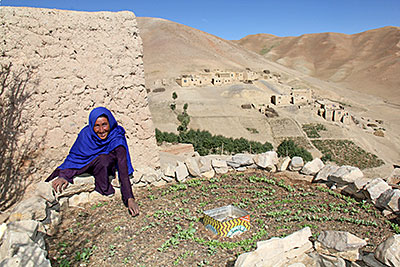The keyhole to hunger in Afghanistan
 Bonu is the poorest woman in a desperately poor Afghan village. She feeds her 3 children from her husband’s earnings as a shepherd. All he receives is a portion of his employer’s wheat harvest and this must last the family all year.
Bonu is the poorest woman in a desperately poor Afghan village. She feeds her 3 children from her husband’s earnings as a shepherd. All he receives is a portion of his employer’s wheat harvest and this must last the family all year.
Every meal is the same: plain wheat naan (a flatbread) and weak green tea. The family has 2 chickens but any eggs must be sold to buy a cup of cooking oil to dip the naan bread in. That way everyone gets to have a bit more food. On the yearly Muslim Eid religious festival, Bonu’s family receives a piece of lamb or goat from a local charity. Otherwise, it’s naan and tea – every day.
Mealtimes are about to become more interesting and more nutritious for Bonu and her family as the crops in their new keyhole garden will soon be ready to harvest. The garden is a simple raised bed which will grow vegetables all year round – even in the freezing winter – thanks to special plastic sheeting which creates a small greenhouse.
Members of Bonu’s community brought their donkeys to carry stones and soil up the steep hillside where she lives to help her build the garden. “It made us happy to help Bonu in this way,” says her neighbour, Fatima. “And now we have learned how to make a keyhole garden if we want one for ourselves.”
The keyhole garden project is part of the work of Catholic Relief Services – a Caritas member from the United States. According to Abdul Malek, its team leader, “Women with keyhole gardens will be able to improve the nutrition of the whole family throughout the coldest months. They are from the very poorest families, so adding vegetables to their diet will make a big difference.”
Bonu’s children are playing a guessing game about which vegetables will be ready first. Will it be the carrots or the turnips? Bonu herself is excited by the upcoming change in mealtimes.
“Before, I couldn’t buy vegetables in the bazaar because they were too expensive. Now we will be able to have them with our nann and tea and I may even have some extra to sell or trade for other kinds of food.”
